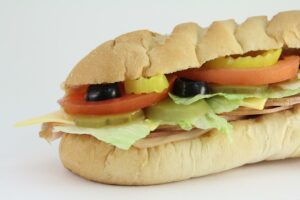Subway Sandwich Suit Sustained – Like Earlier McDonald’s Victory

Subway Sandwich Suit Sustained – Like Earlier McDonald’s Victory; Fast Food Giant Paid Over 10 Million Dollars to Settle Law Students’ Suit
Subway Sandwich Suit Sustained
WASHINGTON, D.C. (July 13, 2022) – A federal judge in California has upheld a law suit claiming that Subway’s tuna sandwiches contain foreign substances not known to or expected by consumers including “other fish species, animal species or miscellaneous products.”
In some ways this legal action is similar to one filed previously against McDonald’s which forced the fast food giant to pay out $10 million plus attorney’s fees, make an embarrassing disclosure, and issue a public apology to the law students who put it together and to other impacted consumers, says public interest law professor John Banzhaf, the man behind it.
Q2 2022 hedge fund letters, conferences and more
Find A Qualified Financial Advisor
Finding a qualified financial advisor doesn't have to be hard. SmartAsset's free tool matches you with up to 3 fiduciary financial advisors in your area in 5 minutes. Each advisor has been vetted by SmartAsset and is held to a fiduciary standard to act in your best interests. If you're ready to be matched with local advisors that can help you achieve your financial goals, get started now.
In at least one way the Subway lawsuit is stronger than the McDonald's one since it charges that a factual representation by Subway is factually false.
But our earlier lawsuit against McDonald's was based upon a claim which was technically true - that McDonald's french fries were cooked in 100% vegetable oil - and which therefore seemed to be welcome news and assurance to millions of American Hindus, vegetarians, and others who would never willingly consume animal products, says the GWU law professor.
However, as the law students' court suit argued, McDonald's claim, although technically true, was actually misleading, since some beef flavoring was actually added during processing before the fries were shipped to - and later cooked in pure vegetable oil at - the local franchise location.
As a result, the lawsuit argued, millions of Hindus, vegetarians, and others who would never even dream of consuming a product containing beef fat were tricked into violating their most strongly held beliefs.
While many had predicted that such a lawsuit, put together by a handful of law students against a giant fast food chain - and where the defendant claimed that it "has never made any claims about the vegetarianism of our French fries or any other product" - had little chance of success, McDonald's gave up rather than try to fight in court.
Under the settlement, the fast food giant paid out $10,000,000 plus attorney's fees, agreed to clarify its food claims so as to better inform those strongly opposed for religious or other reasons to consuming animal products, and issue a public apology, says Banzhaf.
The law students obviously learned a lot, more than they probably would have listening to hours of lectures and Socratic questioning, says Banzhaf, noting for example, that one, James Pizzirusso, is now a partner at Housfeld in Washington, D.C., a major plaintiff's class action law firm.
Because the law professor also played a major role in high-stakes litigation against tobacco companies - indeed, he's been called the "Law Professor Who Masterminded Litigation Against the Tobacco Industry," a "King of Class-Action Lawsuits," and "A Driving Force Behind the Lawsuits That Have Cost Tobacco Companies Millions of Dollars" - it's not surprising that his similar amazing success in the McDonald's suit prompted Slate to ask "Are French Fires The Next Marlboro?," and Fortune magazine to feature a cover story entitled "Is Fat The Next Tobacco?"
Subsequently, the McDonald's case has given rise to a growing number of successful "fat lawsuit" and other food deception cases, forced the restaurant industry to try unsuccessfully to persuade Congress to pass a so-called "cheeseburger bill" to shield themselves for legal liability, and even give rise to expensive courses to train attorneys representing food companies how to defend against such attacks.
Even more broadly, the law students' McDonald’s french fry litigation is credited with opening the doors to the current wave of “food fraud” litigation which has led to hundreds of lawsuits challenging health claims, food advertising, and label omissions.
Updated on
Source valuewalk






